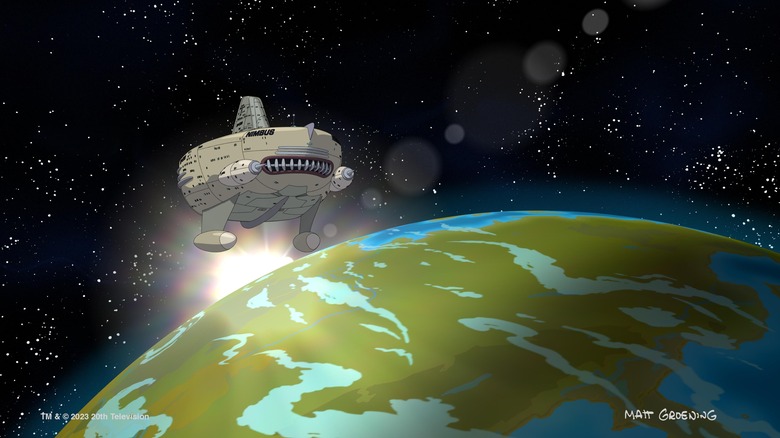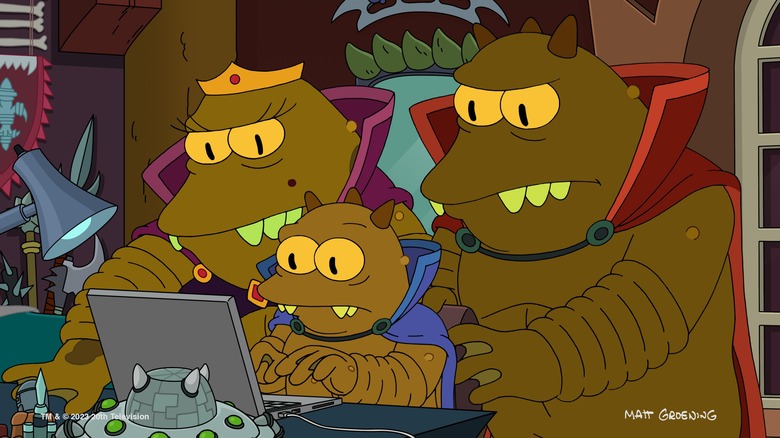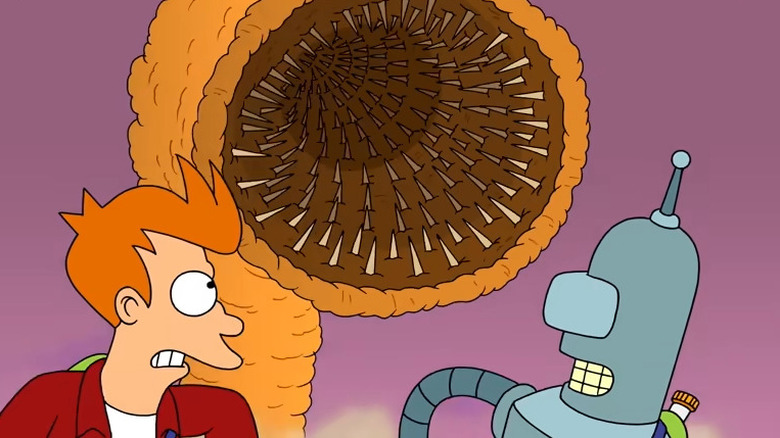Futurama's Hulu Revival Made A Small But Crucial Change To The Show
When Matt Groening's and David X. Cohen's "Futurama" debuted in 1999, it aired on Fox and fit neatly into the traditional network TV 30-minute time slot. Most half-hour TV shows were typically only about 22 minutes of actual programming, allowing for two extended commercial breaks roughly at the 10-minute mark and the 20-minute mark. Because they were beholden to that stringent schedule, most network TV shows worked their writing down to a science, writing stories that could only be told in a very specific way. To some readers, the structure may sound creatively limiting, but one might also recall that old saying about creation vis-à-vis necessity. For generations, TV writing expertly crafted stories that could fit into 30- or 60-minute time slots with ease, carefully writing in climactic moments or comedic punchlines right at the commercial breaks.
This structure certainly aided "Futurama," which was forced to be jaunty and light by dint of its trim running time. Writers had to learn to be efficient in communicating plot points, and clear in establishing character. There wasn't necessarily a lot of time for nuance, but it was an animated sci-fi sitcom that could afford to play broad. And occasionally, smaller moments of casual, incidental humanity were allowed through the door. On the DVD commentary track for the episode "Rosewell that Ends Well," Cohen noted that Leela (Katey Sagal) idly played with a saltshaker in one scene and that it was his favorite miniature piece of animated acting on the show.
On July 24, 2023, "Futurama" was revived (for the third time) on Hulu, and the above structure was altered in a way that seems small, but is actually hugely dramatic. Producer Claudia Katz, speaking with Gizmodo, noted that their usual time limit was expanded by two minutes.
120 sweet, sweet extra seconds
Because the latest "Futurama" revival is on a streaming service, the showrunners were no longer beholden to stringent network TV schedules. Depending on the channel and one's individual subscription tier, many streaming services still include commercial breaks, but there doesn't seem to be as strict a mandate when it comes to overall running times. Thanks to decades-long traditions of TV writers, shows still typically fall into the 22 to 42-minute range, but many shows have taken advantage of their newly unbound running time. HBO famously let "Game of Thrones" episodes run long, with its longest episode being "The Long Night," which ran 82 minutes. That's a feature film unto itself.
For "Futurama," the showrunners have been given an extra two minutes per episode, which for animation is an enormous amount of breathing room. Katz noted that the expanded time frame allowed for "larger" stories that couldn't have been done in only 22 minutes. It's amazing how much story and establishing materials — and gags — can be squeezed into those few extra seconds. She said:
"I think these two seasons of episodes we've produced are probably the biggest in scope so far, at least on average. Moving to streaming has also been a big positive for both the writers and Rough Draft. We're running about two minutes longer which is really liberating for storytelling and giving some of the more stunning visuals a little more time when needed."
Rough Draft refers to the "Futurama" animation studio, located in both Glendale, California, and in Seoul, South Korea. The studio was co-founded by Nikki and Gregg Vanzo, the latter of whom co-directed three episodes of "Futurama" himself.
The season thus far
As of this writing, seven episodes of the revived "Futurama" have already aired, with some of them covering a great deal of narrative ground. In the first episode of the new season, called "The Impossible Stream," Fry (Billy West) sets a new goal for his life: watching every single TV show ever made. He locks himself into a high-tech, iron-maiden-like sarcophagus and begins pumping TV content directly into his eyeballs nonstop. The Professor (also West) explains that the sarcophagus is akin to the stillsuits from "Dune," constantly feeding him and pumping out his (yecch) personal waste. Fry, however, becomes too mentally involved in his TV viewing activities and may die if the shows come to an end. The episode climaxes with Leela creating TV shows in real-time to provide more and more content for Fry.
Speaking of "Dune," the episode "Parasites Regained" contained numerous "Dune" references, including the appearance of a sandworm-like creature and characters whose eyes change color. In "Dune," one might recall that the Fremen have tinted blue eyes from exposure to the Spice. On "Futurama," their eyes turn orange, albeit for comedically different reasons. Given the epic nature of Frank Herbert's novel, it would take a few extra minutes to capture that mood on a half-hour animated sitcom. 120 seconds is the difference between a typical sitcom plot and a full-bore "Dune" epic.
Even smaller-seeming things are now possible. In "Rage Against the Vaccine," a spoof of the COVID-19 lockdowns — and all the anxieties that came with it — all the show's main characters participated in a multi-channel Zoom-like video conference. That kind of sequence requires twelve times the animation. It's with a sequence like that where two extra minutes of screen time feels positively massive.


